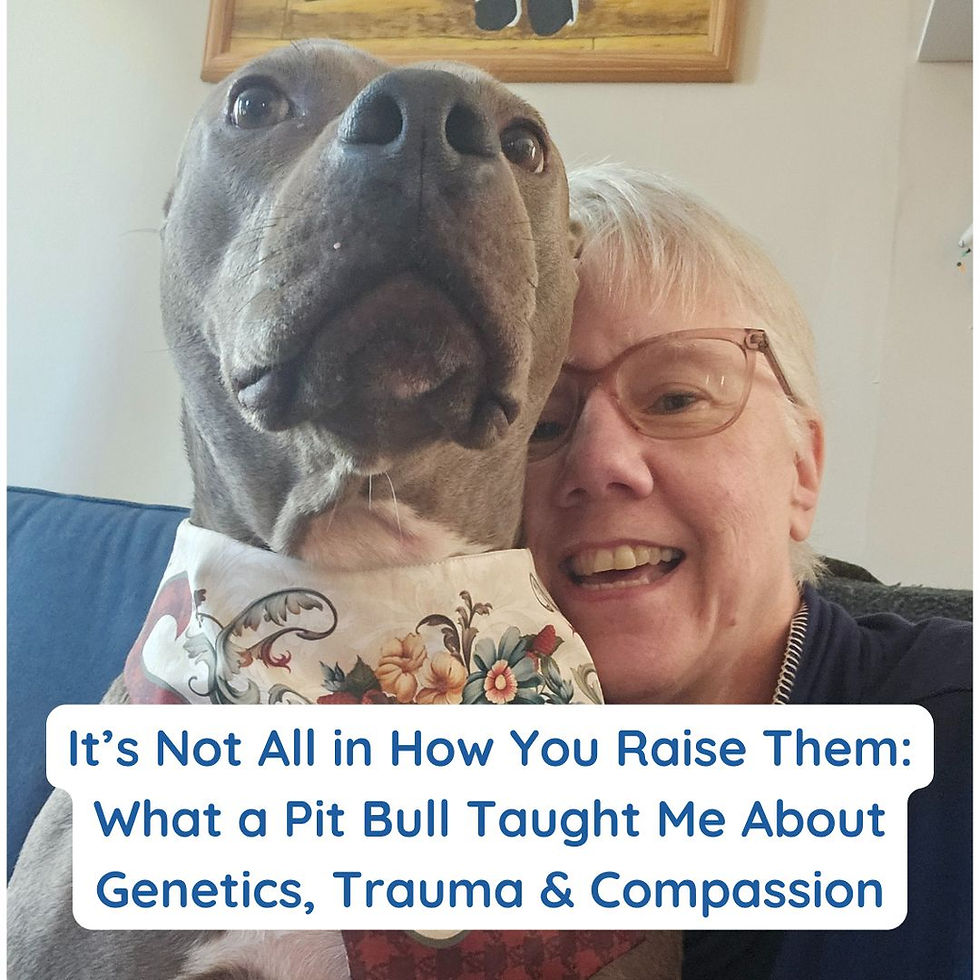It’s Not All in How You Raise Them: What a Pit Bull Taught Me About Genetics, Trauma & Compassion
- Ruth Hegarty

- 6 days ago
- 3 min read

October is National Pit Bull Awareness Month, and as a trainer who’s spent years working with reactive and fearful dogs, I want to take a moment to talk about a phrase that makes me cringe every time I hear it:👉 “It’s all in how you raise them.”
I understand where that sentiment comes from — people want to defend pit bulls against unfair stereotypes. But the truth is more complex, and honestly, that oversimplification hurts the breed more than it helps.
The video has an Archie photobomb!
Meet Shadow Dawn 🌙
A few years ago, I adopted Shadow Dawn, a stunning blue-nose pit bull from Texas. She had been used for breeding and came to me deeply traumatized. Despite all my experience — years of helping reactive dogs learn to feel safe — Shadow was different.
She was terrified of the world. Cars, people, walks, even the sound of the door opening could send her into a panic. I tried everything: medication, behavior modification, enrichment, and expert consultations. Nothing worked. Her fear ran deeper than anything I tried could reach.
Home alone with me, though, she was pure love — spooning me in bed at night, playful and silly during the day, just the sweetest girl you could imagine. But outside, her trauma took over.

Why “It’s All in How You Raise Them” Isn’t True
Shadow’s struggles helped me understand what many people overlook: genetics matter. A dog's behavior is 50% genetics and 50% experience.
Yes, loving homes and positive training do wonders for many dogs who get to go on to live normal lives. But some dogs are born with a predisposition toward anxiety, reactivity, or even aggression. Their mothers’ stress, poor nutrition, or lack of safety during pregnancy can affect their puppies long before birth.
This isn’t unique to pit bulls. I’ve met aggressive golden retrievers and reactive doodles, too. The problem isn’t the breed — it’s irresponsible breeding and misunderstanding how fear and genetics shape behavior.

The Real Problem: Misunderstanding and Misinformation
Pit bulls are the most euthanized breed in U.S. shelters, and yet people still breed them irresponsibly. Society continues to stereotype them — from “vicious” to “perfect nanny dog” — when neither extreme is accurate.
Pit bulls are dogs, just like any other breed. They deserve to be treated that way — not feared, and not mythologized. Breed-specific legislation doesn’t make communities safer; education and responsible ownership do.
What You Can Do to Help
Whether you have a pit bull or not, you can make a difference:
🐾 Use accurate language — avoid phrases like “it’s all in how you raise them.”
🏡 Support breed-neutral policies that focus on behavior, not appearance.
💬 Educate yourself and others about fear, genetics & responsible breeding.
💕 Donate or volunteer with pit bull rescues and educational groups.
🦮 Adopt or foster responsibly, understanding that shelter behavior may not predict home behavior.

Final Thoughts
Shadow Dawn changed how I talk about pit bulls — and how I advocate for misunderstood dogs everywhere. Her story reminds me daily that compassion and understanding, not judgment, are what make real change possible.
If you’d like to learn more about helping your reactive or fearful dog, visit my website Creature Good Dog Training or subscribe to my YouTube channel for more reactive dog support.
Let’s replace blame with understanding — and make every month a chance to see pit bulls for what they really are: dogs with hearts as big as their heads. 💗







Comments